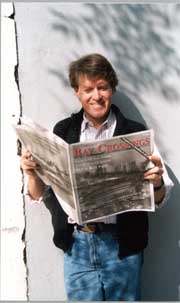 |
| Russell Long,
Executive Director, Bluewater Network |
How’s the
marine environment doing?
Unfortunately,
not all that well. As a nation, we’ve made great strides in
recycling solid waste, making our homes and offices more
energy-efficient, and reducing other waste streams as much as
possible. We’ve even banned several horrible contaminants such as
DDT and lead. But despite this progress, the total volume of
chemical and toxic pollution increases almost daily, as does our use
of fuel and energy, which causes global warming.
Consider that all pollution eventually winds up in the water. This
includes the compounds that cause smog and air pollution, landfill
chemicals from electronic products, oily street runoff from cars and
trucks, farm and home pesticides, and a thousand household products
like WD-40, Clorox, and wood sealants. And then there’s global
warming’s impacts from consumers buying too many products and
using too much fuel and energy. As a result, toxic algae blooms and
fish die-offs are on the rise, coral reefs are also dying, many
marine species are threatened with extinction, and nations like the
Maldives and Tuomotus are experiencing greater flooding.
And a society, we
don’t think through our actions with good policies. For example,
have you noticed that houses have gotten bigger, offsetting the
energy gains we fought for? Or consider that 400 million TVs in the
US built using cathode ray tubes and mercury are going to be
replaced with HDTV over the next ten years. Where will all the dead
TVs go? Landfill, leading to water pollution.
I’m sorry to sound so negative, because first, my nature is
usually pretty upbeat! And second, every day I hear about big
successes in reducing harm to the marine environment.
But while I’m
hopeful about our future, it’s clear that we have to be honest
with ourselves if we’re to tackle these large problems in ways
that really make a difference.
You’re Executive
Director of the Bluewater Network. What is your mission?
Our mission is to
aggressively protect public waters and lands from environmental
threats.
How are you
funded? What will your budget amount to this year?
We’re funded by our growing membership and also from private
foundations. Actually, Ted Turner and his foundation have been one
of our most steadfast supporters over the years. Our budget
continues to grow from zero, when I founded Bluewater Network five
years ago, to close to a million dollars projected for next year.
Are
environmentally friendly ferries possible?
Absolutely. To me
it means a vessel that uses the best available technologies to
reduce the impacts of air and water pollution, erosion from wake
damage, and limits the risk of potential collisions with marine
mammals.
Another option is
to use natural gas to power ferries. Not only is a natural gas
engine FAR less polluting than even the best diesel engine, but it’s
the halfway step towards fuel cells. Right now, there’s an
Interagency Task Force representing the Navy, Coast Guard, the Air
Force, and NOAA that are hoping to develop fuel cells for military
and domestic use, in addition to pollution control. But in an ironic
twist, they’ve informed Bluewater Network that due to lack of
spare vessels for a demonstration project, they’re hoping that new
commercial San Francisco ferries can lead the charge towards use of
fuel cell technology! And they’re ready to pass along their
expertise to help us, which will both aid the military and pave the
way for fuel cells in other types of vehicles and craft in the US.
Collaborating to create a true zero-emissions ferry would be
tremendous for reducing smog and global warming.